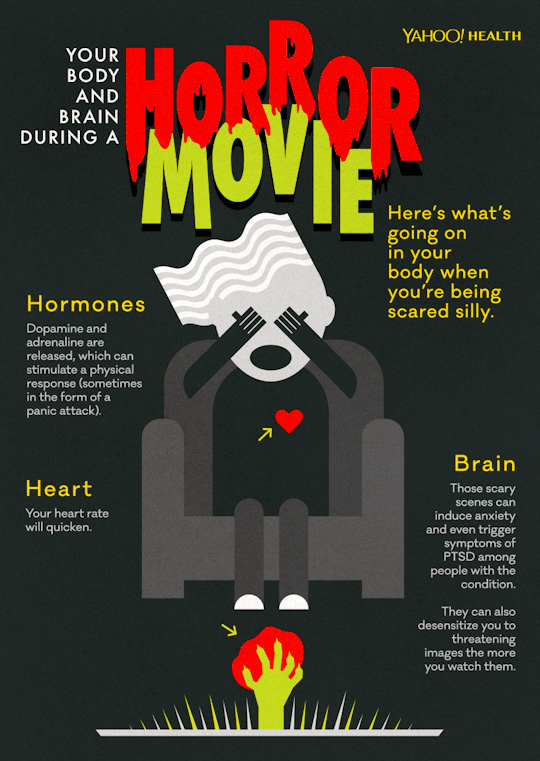What’s Going On in Your Body When You Watch a Horror Movie
If you’re a thrill-seeker, you’re familiar with that rush of excitement you feel during the climax of a horror movie. Whether it’s a gory murder scene, a zombie popping out of the shadows in a dark room, or a terror-inducing poltergeist, you love it when your heart begins to race and you’re forced to grip the armrest.
But horror movies can also leave you scared sick. Sure, you know Freddy Krueger and Jigsaw exist only onscreen, but they still make your palms sweat and leave you with nightmares for weeks.
“The brain is wired to treat what it sees as real,” Glenn Sparks, professor and associate head of the Brian Lamb School of Communication at Purdue University, tells Yahoo Health. “It is very difficult to tell the primitive brain to ignore the apparent reality of what it is seeing, and if the images appear to be real and terrifying, the brain tells the body to react accordingly.”
Horror movies can affect your brain and body in ways you may not even realize, so if you have a history of physical or mental health issues, think twice before pushing Play.

Your brain
In rare instances, watching horror movies can cause PTSD, but it’s more common that they trigger a reaction in people who already suffer from the disorder. “Since the brain cannot tell the difference between fantasy and reality, memories that relate to a situation shown in a movie that have elements of a previously traumatic situation can trigger both a physical and psychological response,” Bernard Luskin, president emeritus of the Society for Media Psychology and Technology, tells Yahoo Health.
Anxiety can be a lingering effect of watching horror movies, especially when children are exposed to them at a young age. “The physical reactions to horrifying images can include sweaty palms, tense muscles, a drop of several degrees in skin temperature, a spike in blood pressure, and an increase in heart rate,” Luskin says.
While watching horror movies doesn’t directly have an impact on your brain in a positive way, according to experts, it does have a desensitization effect. “It is possible that a person could repeatedly expose oneself to a threatening image and over time become less emotionally reactive to that image and suffer lower levels of anxiety and fear as a result,” Sparks says. “We might call that a positive outcome or effect.”
Related: Meet the Woman Who Feels No Fear
Your heart
In a similar way that adrenaline-raising activities can affect your body, watching horror movies can cause an increase in heart rate. “There is no question that many people have increased heart rate as they watch a horror movie,” Sparks says. “These effects are not unlike what happens while doing other sensation-seeking activities like riding roller coasters or skydiving. The physiological effects can be quite similar.”
It can even affect heart attack risk. “When the physical response and the psychological response come together in a person at exactly the right time, a heart attack, even a silent heart attack, can occur,” Luskin says. “Individuals with high blood pressure for any reason may be more at risk than others because heart attack and stroke are related to blood pressure.”
Related: ‘Vampires’ Keep Doctors in the Dark for Fear of Stereotyping
Your behavior
The arguments for horror movies causing aggressive behavior are similar to the arguments made about video games. “Any activity that heightens emotional response, especially in a person with emotional problems, can trigger aftereffects,” Luskin says.
Your hormones
Watching horror movies releases dopamine and adrenaline, which can stimulate a physical response. “In relatively rare circumstances, a physiological reaction can be so severe that it can trigger someone to faint or have a panic attack,” Sparks says.
Read This Next: What’s Going On in Your Brain and Body During an Argument
Let’s keep in touch! Follow Yahoo Health on Facebook, Twitter, Instagram, and Pinterest.
